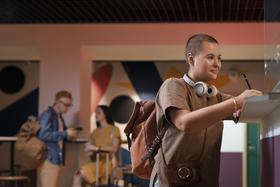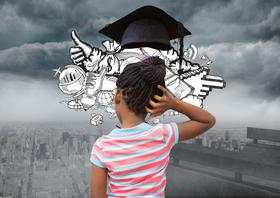Read more details about Choate Rosemary Hall on their 2025-26 profile page.
Reflections and Advice:
1.) What do you think makes your school unique relative to other boarding schools?
I know a lot of people who went to boarding schools, and I looked seriously at 5 other schools besides Choate, and one thing that I found out was that Choate cannot be easily stereotyped. It always seemed as if Exeter was a grind school where the kids worked ridiculously hard, Taft was really preppy and simple, St. Paul's was insanely preppy, but Choate....people just knew of it as a good school, and I think this is true because the people who went there had various interests; the student body is uniquely diverse. We had kids from all over the world, and there was no overwhelmingly large population of kids from one area; I know that Hotchkiss, for example, was known for being a New Yorker haven, but Choate kids hailed from everywhere. Being a New Yorker, I appreciated the lack of people from there. Choate kids weren't caught up in the trends that dominated most high school kids. There was no bag or pair of jeans that every girl "had to have". Another reason that the kids from Choate are so diverse is because the school itself excells in all aspects of education. Choate caters to kids who are well-rounded.
Addressing specific characteristics that were mentioned, there was no specific teaching method, but we had an amazing faculty. They all cared abotu kids and teaching because there is no reason that they would have been in Wallingford, Connecticut if they didn't. There was no mandatory volunteer work, but most kids wanted to participate in some sort of community service, and the campus was set up well. It is situated in Wallingford, a 5 minute walk from the center of town. Streets do pass through the campus, but it is not a heavy traffic area.
2.) What was the best thing that happened to you in boarding school?
I loved Choate because of the people that I met. The teachers stand out as the best teachers that I have ever had, and the friedns that I made there are irreplacable. They are all smart, caring, interesting, dynamic people, and I don't think that I would have met such real people if I had gone to another boarding school where it would have been easier for me to fall into a New York crowd. I made friends with people who I shared values and interests with rather than people who dressed similarly to me. I compare all my friends in college to my friends in high school, and they don't even come close. I think there is something about boarding schools in general that makes you grow ridiculously close to people in a short period of time. I also compare my college professors to my high school teachers, and I find that my high school teachers expected more out of their students than my professors do, and my teachers in high school definitely cared more for their students than professors do.
3.) What might you have done differently during your boarding school experience?
I loved Choate, and I would not have traded my experience for anything else, but I do think that 14 was too young to go away. In the end, all the traumas of my freshman year seem silly, but at the time, when I was a freshman, it was hard to live away from home with a bunch of other girls.
4.) What would you never want to change about your school?
The teachers and the students.
5.) What things could be improved about your school?
The town, but that's impossible, and the athletics and arts departments could be improved.
6.) Do you have any final words of wisdom for visiting or incoming students to your school?
Go to Vinny's
Have snow fights when it's snowing
Play in the rain
Go mudsliding and sledding
Take Irish Lit.
Academics:
1.) What did you like best about your school’s academics?
I liked the fact that teachers would not let you get away from them without teaching you something. Teachers never gave up on their students, and they did not put up with kids who sat in the back of the class room and feigned attention. Those kids who spoke up a lot and worked hard were paid attention to, but teachers never overlooked those who needed help. They were always available outside of class for help, and they were very inviting. Teachers cared about their students as students and as kids; they were interested in getting to know us.
2.) What did you like least about the academics in your school?
I thought that the workload was at times unbearable, but it did teach me how to work, and college seems easy because of it. I think they could have done a better job of helping us to keep things in perspective. A lot of the time, I felt as if I was being unreasonable when I complained about how much work I had to teachers while asking them for extensions, but now I know that I really did have too much work.
Athletics:
1.) What did you like best about your school’s athletics?
I liked the fact that they catered to people of all skills, and I liked how Varsity athletes were not given extra praise that they did not deserve. There was no focus on athletics, but games were well attended, and school spirit was apparent. The gym is incredible right now, and it is better than my gym at college. The intramurals were diverse and fun, and I enjoyed the fact that I had to do something every afternoon, (sports were mandatory every trimester, and if you didn't do a competitive sport, you had to do an intramural one). It taught me how to live a healthier life and how to manage my time.
2.) What did you like least about the athletics in your school?
Some sports were not well-attended, for example, junior varsity sports like volleyball or girls hockey. I don't think that the team members cared though, because they were playing to play, not to impress. The Varsity teams were competitive, but it was apparent that sports were not Choate's forte.
Art, Music, and Theatre:
1.) What did you like best about your school’s art program?
The Arts Center at Choate is beautiful, and as petty as that sounds, I think it makes a difference. It made me interested in arts, which I would have taken regardless because Choate requires a small amount of art to be taken for graduation. We had good photography facilities and an interesting and eclectic arts faculty. Art was well-respected, and the theatre program was great. The try outs were open to anyone and everyone, and the same thespian hierarchy that exists everywhere else did not seem to exist at Choate; everyone was given a fair chance. We also hosted a lot of other plays that were well attended by the Choate and the town community. The classes were all small, ranging from 5 to 15 people.
2.) What did you like least about your school’s art program?
The photography classes do not go very far. They have since changed, and there is now a level III, but level II was the highest when I went there. Also, there does not seem to be a lot of room for arts classes in our schedules.
Extracurricular Opportunities:
1.) What did you like most about the extracurricular activities offered at your school?
Anyone could start a club, and the school is very liberal, so any sort of club can be started. I think that the liberal environment really helped a lot of clubs in terms of their participation. In terms of creating any organization, the school awarded anyone who showed initiative and dedication.
2.) What did you like least about the extracurricular activities offered at your school?
There were not many opportunities to do volunteer work in the surrounding area. Most of the volunteer work centered around Choate, and we rarely involved ourselves in the town.
Dorm Life:
1.) What was the best thing about dorm life in your school?
Dorms changed every year, which was great because it led to many people meeting each other and becoming friends who might not have otherwise ever spoken. The dorms were all very unique; some were old houses, and others were quite modern. Some of the dorms were actually houses, and they were beautiful. Advisers were a lot of fun, and they could all be convinced to take kids bowling or for food runs. Some advisers really went out of their way to make dorm life fun; the freshmen boys advisers are known for opening up the pool late and night and letting kids go swimming or taking them to concerts. Food was always accessible, and privileges came with age, which was good. The roommate selection process was good for freshmen; there was a lot of thought put into placing roommates together, and if there was a problem, it was not difficult to change dorms or roommates.
2.) What did you like least about dorm life?
The lottery system was awful, but that has since changed, but I believe that the system that it was replaced with is pretty bad as well. There are also a lot of bad dorms as well. Oh, the curfews and visiting hours rules were not great, but no boarding school is that liberal that it avoids them. Boys had to have permission to be in a bedroom but the common room was a free for all, and curfew on weekdays was 9:30, 11 on Fridays and 11:30 on Saturdays.
Dining:
1.) What was the best thing about your dining arrangements?
The food was amazing, better than home cooking, and the Dining Hall is beautiful, so beautiful that I capitalize the D and H. The head of the food stuff at Choate really cared about what we wanted and he listened to all of our comments. We had all sorts of food. There was an ethnic food section, and what was served there changed everyday. Food like hamburgers, chicken fingers, etc. rotated on a weekly basis. Pizza was available every lunch, the desserts were always amazing, pasta was always available, cereal was always there, the sandwich bar was great, the salad bar was fresh, the ice cream (on Sunday nights) was delicious, the fruit was fresh, the brunch was out of this world, everything from made to order omelets to chocolate chip pancakes and belgian waffles....i could go on.
2.) What did you like least about your dining arrangements?
Nothing. The food was spectacular. It could have had longer hours, but that would have been unreasonable.
Social and Town Life:
1.) How welcome did you feel by the other students when you first arrived at the school
I picked Choate because kids seemed happy. I made friends easily because all the freshmen live together, and the boys and girls dorms are right next to each other. The students are generally nice people, and everyone is interested in getting to know everyone else because the school isn't so big that you are unnoticed or so small that they get bored of one another easily.
2.) Describe the level of diversity and integration of students in your school:
I did that already, but to restate what I already said, the students are very different and interesting. The normal boring standards don't hold true for them, and they don't fall into stupid stereotypes either.
3.) Describe typical fun activities you did on a weekend:
Friday night might include some activity that the school provided, like a movie in the chapel basement or a talent show or a speech or something that everyone was going to, and then Saturday would include breakfast, then watching sports games or playing in a game, then hanging out, ordering dinner or going out to dinner, then going to the school dance, and those were actually always fun, every year for 4 years. Then we would go back to the dorm, maybe go for a food run, and go to bed. Then in the morning we had brunch, maybe went to salvation army or dairy queen in between doing work.
4.) What was the town like?
Students did venture into town, which consisted of a couple restaurants and diners, a CVS, a coffee shop, now one clothing store, antique stores, and salvation army, a dairy queen, and a train station. The town was not much fun, but it provided entertainment mostly on the weekends during the day in the spring. There was not much reason to leave campus, but if you needed to go food shopping, that required a car. There was no movie theatre either.
Daily Schedule:
Weekday
7:30 AM
Wake up and get dressed
8:00 AM
French Honors
9:00 AM
BC Calculus
10:00 AM
Free period- check e mail and study for test
11:00 AM
Marine Biology (test)
12:00 AM
Free period- have a great lunch in the Dining Hall
1:00 PM
Free period- stay at lunch for a while and then do work until class
2:00 PM
Irish Literature
3:15 PM
Run down to sports with friends and go running for my weight lifting class
5:00 PM
Return from dorms after checking mail, tired and hungy, shower, get ready for dinner
6:00 PM
Meet friends in the Dining Hall for dinner
7:00 PM
Leave dinner and go to a Make-A-Wish meeting
7:30 PM
Go back to the dorm and do work
9:00 PM
Go to break (from 9-9:30 vendors come to Choate and kids congregate outside)
9:30 PM
Check in with advisor, continue doing work
11:30 PM
Break from work and snack with dorm mates
11:45 PM
Get back to work
1:00 AM
Go to bed
Weekend
10:00 AM
Wake up, do some work, get dress
11:00 AM
Have breakfast in the Dining Hall with friends
12:30 AM
Go to see the soccer game
2:00 PM
Go to CVS to pick up my pictures
2:30 PM
Go to my room and make phone calls
3:15 PM
Do work
4:45 PM
Get picked up by lindsay (my day student friend) and go to her house along with 3 other girls
5:15 PM
Arrive at lindsay's house
6:00 PM
Go to New Haven with Lindsay and my friends for dinner
8:00 PM
Go back to Lindsay's, people start coming over because she is having a party
10:00 PM
Go home
1:30 AM
Now i am asleep
Read more details about Choate Rosemary Hall on their 2025-26 profile page.
Alumni Reviews Review School
Review
Description
At Choate, I felt that the faculty and administration really cared about my wellbeing and growth. Classes were mostly organized to allow for discussion and office hours were easy to attend and allowed for personal. . .
Choate has a diverse and interesting study body from all around the world. While it is an old and prestigious boarding school, I found Choate to be less traditional than some of its peer schools. . .
The community is definitely Choate's greatest asset, and the admissions folk do a great job of picking students. We're a pretty chill bunch, so you won't find much of the cut-throat competitiveness that usually accompanies. . .
Show more reviews (27 reviews)
Recent Articles

Balancing Boarding Life
A clear, practical guide to balancing boarding life and independence, offering transition tips for students and families in 2025.

Balancing Boarding Life and Independence: Student Transition Guide
A clear, practical guide to balancing boarding life and independence, offering transition tips for students and families in 2025.

Why Consider Boarding School in 2025: Updated Benefits & Realities
Explore why boarding school remains a compelling option in 2025—academic excellence, global exposure, personal growth, and evolving financial aid make it a powerful choice.





